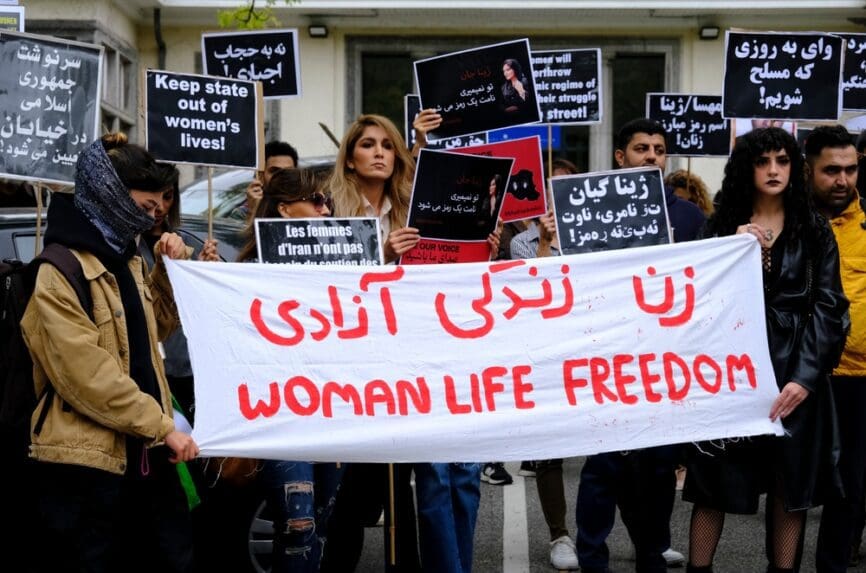Bioethics Forum Essay
Theocracy Is Closer Than It Appears
On a cloudy afternoon this month, in my home in western Pennsylvania, a headline catches my eye: A federal judge in Texas suspended FDA approval of mifepristone. This abortion-inducing drug has been on the market for more than 20 years. Although the decision is presented with a secular and legal façade, like other recent antiabortion court rulings and legislation, a solid religious motive is at play.
My memory takes me to another cloudy afternoon in the fall of 2008 in Tehran. In my medical ethics class for medical students, I was explaining secular philosophical arguments on the morality of abortion at different stages of embryonic development. A student raised her hand. Her hijab showed she was pro-government, an observing Muslim, or both. I let her speak. She said: “You are talking about the philosophical arguments on the morality of abortion. But human beings have a creator. And, like a manufacturer that issues a manual for the appliances it produces, our creator has sent a clear guideline for us to follow. So, isn’t it better to seek answers about abortion from that guideline rather than faulty manmade philosophies?”
That student was not asking a question. She was warning me politely. A decade ago, the founding leader of the Islamic Republic of Iran, Ayatollah Khomeini, in his will, asked Muslim students to rise up against professors who promoted Western ideas. His instruction was explicit: Ask the school officials to remove them. If they hesitate, act yourself!
Theocracy did not capture the political sphere of Iran overnight. The Islamists did not appear to be self-righteous and authoritarian at first. For decades before the 1979 revolution, leaders and theorists of political Islam tried to engage in secular arguments and prove the compatibility of their ideas with modern science and progressive ideologies. Even in the first months after the revolution, many argued that the Islamic Republic would not impose Sharia on the private spheres of people’s lives. They asserted that under an Islamic government, wearing a hijab would not be forced on women, and people opposed to the Islamic government, even communists, would be free to express their ideas. All these promises turned out to be false as soon as Islamists seized power. Since then, they have been imposing the “will of God” and the righteous way of life on people, especially women.
Like other proponents of religious biopolitics, Islamists are pro-natalists. Shortly after the revolution, Islamists in the government terminated all family planning programs. They banned abortion. Shortly thereafter, a more pragmatic sector of the government, alarmed by rapid population growth and the shortage of educational and health resources, tried to reinstate a new version of population control. In response to the high rate of illegal abortion, the Islamic parliament passed the Therapeutic Abortion Act in 2005. Under that law, abortion was permitted within the first four months of pregnancy if a pregnant woman requested it and three physicians confirmed a major fetal health risk or an unbearable difficulty for the woman because of her pregnancy.
However, these relatively liberal reforms were temporary. The subsequent dominance of more fundamentalist Islamists in the government prompted a reversal. On October 16, 2021, Ebrahim Raisi, the president of Iran, signed a new law titled “The Rejuvenation of the Population and Protection of the Family.” This law required abortion decisions to be made in a religious court rather than a medical clinic. While physicians must be consulted to approve the medical necessity of the abortion, the court, presided over by a male graduate of an Islamic seminary, makes the decision. It is not surprising that a few days ago, President Raisi expressed his concern about the high rates of illegal abortion in the country.
The current “Woman, Life, Freedom” movement is a new step in Iranians’ long and bloody journey to free themselves of religious biopolitics and regain their personal liberties. A theocracy, once looked upon as too far away to be concerned about, is now too strong to get rid of easily and without bloodshed.
In his book, Escape from Freedom, Erich Fromm gives a psychoanalytic expatiation of why human beings tend to obey a patriarchal figure rather than take the responsibility of making difficult autonomous decisions in a democracy. He explains how that human tendency was one of the reasons behind the fall of the culturally rich and civilized nation of Weimar Germany to the authoritarian dictatorship of Nazis.
Today, Western nations look at the tyranny of authoritarianism, from the Inquisition to Fascism, as if it is in the side mirror of their collective memory: events that happened too long ago to be of concern. However, objects in a car’s side mirrors are closer than they appear. A judge’s ruling in Amarillo, Texas, may soon have a bearing upon the reproductive freedom of women on New York’s Upper West Side.
That’s why in his masterpiece The Little Prince, Antoine de Saint-Exupéry warns inhabitants of planet Earth about the danger of baobab trees. “You must see to it that you pull up regularly all the baobabs at the very first moment when they can be distinguished from the rose bushes which they resemble so closely in their earliest youth.”
The metaphor is clear but worth making explicit. Ideologies such as religious fanaticism in the modern world are like baobab trees on a small planet. At first, they resemble flowers or fruit trees. However, if you keep ignoring their danger, they will become invasive enough to tear the whole planet apart. As a bioethicist who escaped Iran’s theocracy, it pains me to see the sprouting of baobab trees on America’s democratic soil, a country that has provided me with refuge and opportunity. As a grateful American citizen, I feel a duty to warn about the threat of religious biopolitics dominating the public sphere. I lived in the shadow of a baobab tree for too long. I prefer the sunshine of secular democracy.
Acknowledgment: The author of this paper would like to express his gratitude to Professor Joseph J. Fins for his helpful and constructive comments.
Kiarash Aramesh, MD, PhD, is a faculty member and the director of the James F. Drane Bioethics Institute at PennWest University in Edinboro, Pa.













I think that opposing laws or policies you don’t agree with by labeling them “religious,” or “theocratic,” is a flawed approach. After all, the Religious Society of Friends, the Catholic Church, and others, oppose the death penalty; should that stop progressives from fighting to eradicate the death penalty in the US? Virtually all the white abolitionists before the Civil War were either Quakers or passionately religious Evangelic Protestants–they had a belief about the moral status of Black people and they fought to impose that belief on others. Let’s focus on the content of the issue, and not on which side various religious powers are on.
An imaginative, forceful and convincing essay. Thank you!
What is the relationship btw theocracy and Sharia Law?
The writers appears to be saying
‘I don’t like theocracy … and especially not the one I once lived under’. That is an argument from experience at once powerful and limited. Experience, especially traumatizing experience, can limit perspective, preclude dialogue, and reinforce biases and pre-judices (pre-judgements).
We’ve seen this happen with theocratic-styled justifications for White Supremacy where apocalyptic, fundamentalist arguments are deployed: ‘the White race is threatened’, ‘is the exceptional Protestant-dominant culture of the United States crumbles the country will crumble’, etc. And if we are honest we’ve seen this happen with apocalyptic, fundamentalist arguments deployed by climate crisis advocacy – ‘unless you submit to the authoritarian-regulatory regime designed and desired by elite authorities our society is threatened’ – deployed by too many public health elites (who would have known better if they had read the Public Health Code of Ethics) commanding society-level lockdowns, validated by reference not-quite-scientific oracles by cultural demigods (with sanctions and penalties and without protections of Constitutional and human dignity and rights) – deployed also by abortion advocates who disregard, defame, and sometimes with religious-sounding incantations blaspheme the humanity of unborn infants. Contrary to the writer’s statement that ‘religious biopolitics’ always supports unborn life there is a fundamentalist authoritarian ‘biopolitics’ among many who claim ‘my body my choice’, ‘abortion on demand’, etc.
So, theocratic-styled movements and arguments are abundant among us, We need to reflect on the values that bind us together and how they work to protect the ‘equal rights’ of all of us in a greatly diverse nation. ‘White Supremacy’ values cannot do that. Neither can ‘abortion in demand’ (for whatever reason I desire, when I desire, by means I desire). Neither can government-aligned (rather than community-engaged) public health demigods. Neither can ‘anti-racism’ theories that posit better and worse races.
Kindly become familiar with Th Jefferson’s First Inaugural Address – https://avalon.law.yale.edu/19th_century/jefinau1.asp – that serves as (because he meant it to be) tutorial on the still-new Constitutional government.
Jefferson – as would many Founders – explicitly references that the new government is NOT decided by zealots – like the centuries of religious wars in the ‘old world’ (not just Europe). Jefferson appeals to commitment to ‘republican’ (small ‘r’) motivations in the new government’s form – so long as by a majority, governing ‘reasonably’, that protects the ‘equal rights’ of the minority. Jefferson makes explicit reference to what we today would call a ‘civil religion’ that should promote
“honesty, truth, temperance, gratitude, and the love of man; acknowledging and adoring an overruling Providence, which by all its dispensations proves that it delights in the happiness of man here and his greater happiness hereafter — with all these blessings, what more is necessary to make us a happy and a prosperous people”
& Jefferson summarizes what government must be and do in concert with values of this civil religion
“a wise and frugal Government, which shall restrain men from injuring one another, shall leave them otherwise free to regulate their own pursuits of industry and improvement, and shall not take from the mouth of labor the bread it has earned. This is the sum of good government”
The entire address is worth reading. It reminds that the country was conceived as a society that actively sought to INCLUDE religious groups into governance not to EXCLUDE them; under the principles and values of a civil religion.
THIS is what we all need to be discussing in there hyper-ideological, hyper-identity political, hyper-partisan reality times. Ethics experts should be leaders with evoking a civil religion that does what Jefferson says.
Thank you.
Thank you for this spirited essay and it’s necessary warning against the dangers that arise when religion and politics too closely mix. I am wondering, though, if the author might imagine for us a middle ground between a moral outlook grounded in fundamentalist beliefs and one based wholly on secular premises.